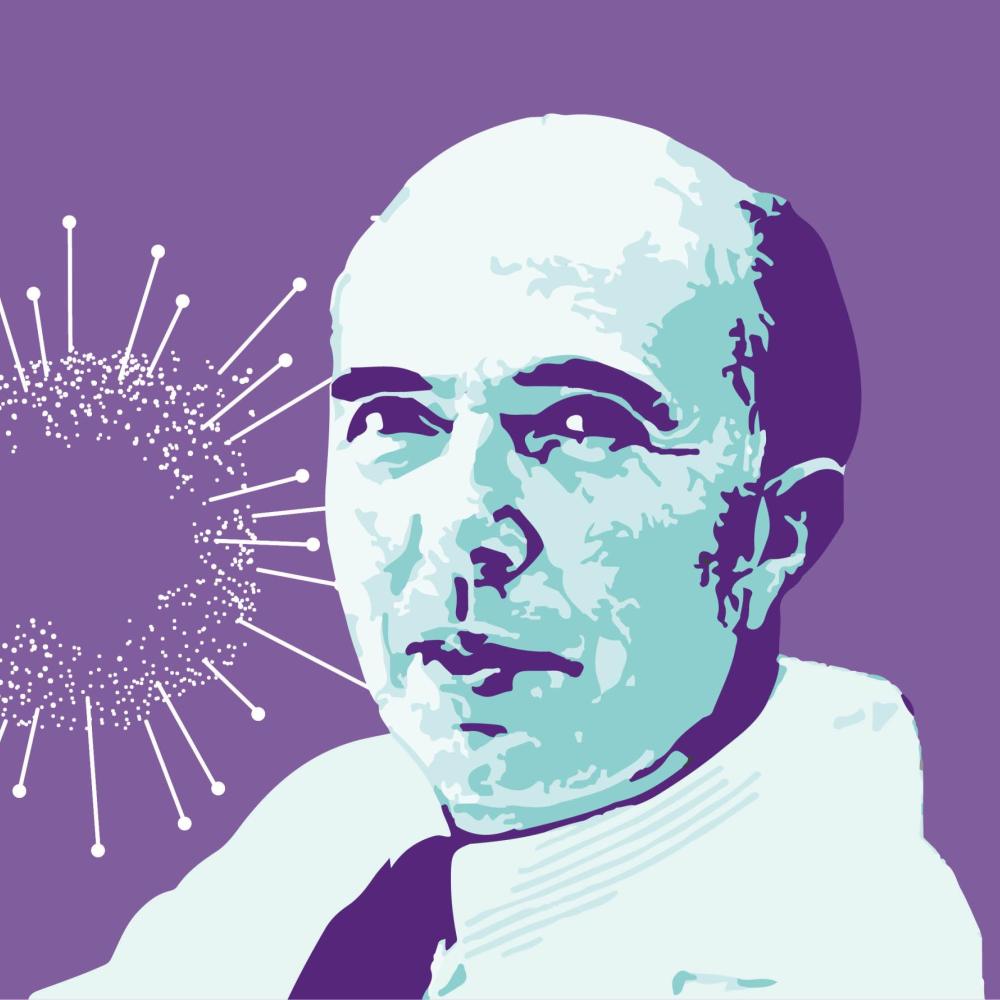

Renato DULBECCO (°1914 - 2012)
Profession: Virologist, molecular biologist, and cancer researcher
Nationality: Italian
Why an honorary doctorate?
Renato Dulbecco's achievements led to him being awarded an honorary doctorate by VUB in 1978.
Unlimited at every level
In 1978, Renato Dulbecco received an honorary doctorate from VUB. His relentless drive for research led to scientific milestones that changed the face of the struggle for human health forever. Dulbecco expanded his field of research overseas, following VUB's philosophy that knowledge and insight are limited neither literally nor figuratively to one's own familiar borders. The input from the constantly changing group of young, motivated researchers with whom he worked forced him to re-evaluate his work again and again. These are Dulbecco's own words and they represent the vision that VUB passes on to its students every day.
No progress without research, no research without progress. Renato Dulbecco knew how to combine sublime scientific knowledge with a hunger for evolution. Although the numerous awards emphasised the value of his work, he also honoured the influence his colleagues had on his professional career. With his quote "Competition, I think, is always a good thing", he does not so much refer to rivalry between people. He refers to the power to challenge yourself for a better result that serves the greater good. Striving for better does not imply that this happens at the expense of others, but rather that those same others are (or can be) a constant source of inspiration.
"Competition is always a good thing."
About his career
The siren call of research
It is 1936. Dulbecco has barely left university when he is called up for military service as a medical officer. The Second World War breaks out and he is again obliged to go to the front in France and Russia. He is shocked by the rabid hatred of Jews and vows never to identify with such a regime. After Fascism is completely on its knees, Dulbecco joins the resistance against the German occupation.
After the war, he returns to work in Professor Levi's laboratory in Italy. But he finds it difficult to get back into the swing of things.
It is Salvador Luria, whom Dulbecco met during his student years, who persuades him to come to the United States. Luria introduces him as a researcher at Indiana University in Bloomington, where together they study bacteriophages (a small virus that only infects a specific bacterium). It is now 1947.
In the summer of 1949, Dulbecco meets biophysicist Max Delbrück and joins his team at the California Institute of Technology (Caltech), one of the most prestigious technical universities in the world. There, he throws himself into the study of animal oncoviruses, which are the cause of some human cancers.
In the late 1950s, together with Howard Temin (geneticist) and David Baltimore (biologist), he investigates the interaction between tumour viruses and the genetic material of a cell.
Their achievements earn them the Nobel Prize in Physiology or Medicine in 1975.
Dulbecco later works for the American scientific research centre The Salk Institute and the Imperial Cancer Research Fund, among others. In 1993, he returns to Italy where he becomes President of the Institute of Biomedical Technologies in Milan.
Three days before his 98th birthday, this brilliant mind gives up the ghost.
Military service
1940-1945 the Eastern Front, an experience that was engraved in the memory of Italian Renato.
Curious researcher
Once in America, he quickly begins a collaboration with Max Delbrück on animal oncoviruses.
Nobel Prize in Medicine 1975
Together with Howard Temin (genetics) and David Baltimore (biology).
1965. Marjory Stephenson Prize
1973 Louisa Gross Horwitz Prize
1974 Selman A. Waksman Award
What is an honorary doctorate?
VUB has awarded honorary doctorates every year since 1978 to personalities from the most diverse backgrounds who have made a remarkable contribution to their field and to society. From this solemn moment of recognition, they bear the honorary title of Doctor Honoris Causa of VUB.